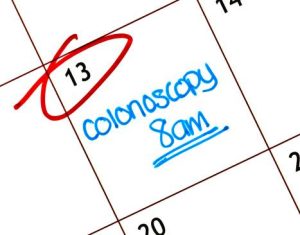How To Prevent Colorectal Cancer
Happy 50th birthday – time for a colonoscopy! You can prevent colorectal cancer with a colonoscopy, which detects early cancer. There will be approximately 150,000 new cases and 50,000 deaths from colorectal cancer this year, according to the American Cancer Society. The lifetime risk of developing colorectal cancer is about 1 in 20 (5%). Colorectal cancer is the second leading cause of cancer-related deaths in the United States.
 Colon cancer screening is completed by only 50% of women over 50… much lower than cervical and breast cancer screenings, which are closer to 80%. Women mistakenly think the risk is only for men, but women face the same risks for colon cancer. The goal is to increase colonoscopy screenings to match those of the PAP test and mammograms.
Colon cancer screening is completed by only 50% of women over 50… much lower than cervical and breast cancer screenings, which are closer to 80%. Women mistakenly think the risk is only for men, but women face the same risks for colon cancer. The goal is to increase colonoscopy screenings to match those of the PAP test and mammograms.
Colon cancer develops from polyps that grow on the lining of the colon in 30-50% of the population. Over time, generally over 10 years, polyps may grow larger and more advanced and develop into colon cancer. Approximately 10% of polyps will develop into cancer. Polyps are more common as we age. It is a highly preventable cancer, because the polyps that lead to cancer, are removed during the colonoscopy.
While the test can be anxiety producing, gastroenterologists have worked to make it a more tolerable experience. Aromatherapy, music, and appropriate sedation, make it a more peaceful procedure that many find very manageable.
Bowel preparation is an important component of a good colonoscopy to allow for a clear view of the colon:
- The day before the test, you stick with a clear liquid diet including broths.
- The evening before the test, you consume the first, of two, oral laxative doses.
- You will most likely have one purge before you go to bed.
- Fasting begins at midnight and continues through to the test the next day.
- In the morning, drink the second laxative dose and experience another purge.
 There are two levels of sedation offered patients. Conscious sedation is the standard of care. You are awake but relaxed and can respond to commands. The deeper sedation requires monitored anesthesia care. You don’t hear anything and wake when the procedure is over. Patients should talk to their physician ahead of time to determine the appropriate level of sedation. During the procedure, the colonoscope, a thin, flexible tube, with a camera, is used to look at the entire colon. Air is used to inflate the colon to allow for a clear view of the colon lining. If polyps are discovered, they are removed during the procedure and sent for biopsy. For most, it will be an every ten-year test, for those with polyps, more frequently.
There are two levels of sedation offered patients. Conscious sedation is the standard of care. You are awake but relaxed and can respond to commands. The deeper sedation requires monitored anesthesia care. You don’t hear anything and wake when the procedure is over. Patients should talk to their physician ahead of time to determine the appropriate level of sedation. During the procedure, the colonoscope, a thin, flexible tube, with a camera, is used to look at the entire colon. Air is used to inflate the colon to allow for a clear view of the colon lining. If polyps are discovered, they are removed during the procedure and sent for biopsy. For most, it will be an every ten-year test, for those with polyps, more frequently.
Benefits Of Colonoscopy
Because of the effectiveness of the colonoscopy, effective treatment options, and greater insurance coverage, deaths over 50, have actually declined over the last 20 years. The incidence is increasing, however, for 25-49 year olds.
Colonoscopy is recommended beginning at age 50, but for those with a family history of colon cancer, the test should be done sooner. There is a greater awareness to explore new symptoms in people under 50 to avoid a delayed diagnosis. You should visit your GI doctor if you experience any of the following symptoms:
- rectal bleeding
- change in bowel habits
- abdominal pain
- anemia
Lifestyle risk factors that may help prevent colon cancer:
- don’t smoke
- drink alcohol in moderation
- maintain a healthy body weight
- stay physically active
- eat a diet focused on fruits, vegetables, whole grains, and low in red and processed meats
Scheduling your colonoscopy, after age 50, or earlier if you have risk factors for colorectal cancer, may prevent the disease and even save your life. Take the time to get this important test!
by Christy Coughlin
